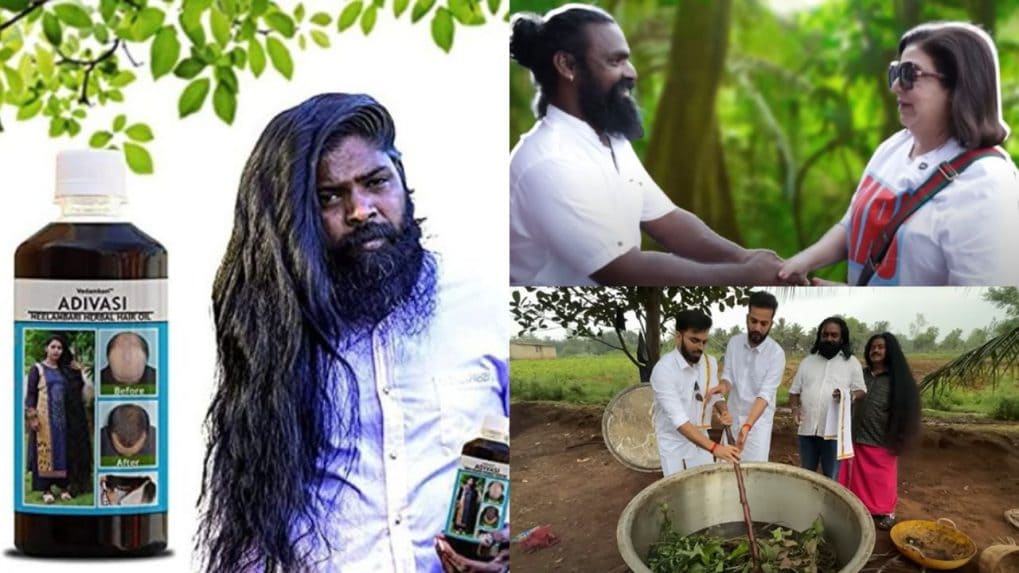Adivasi hair oil: Are the influencer endorsements and product packaging credible?
Neelambari Adivasi Hair, which claims to be a concoction of 108 herbal ingredients, has lately been the talk of the town, all thanks to promotions by well-known faces. Storyboard18 spoke with agency and brand experts to understand the credibility of such endorsements, their packaging as per industry standards, and more.
ADVERTISEMENT
Adivasi hair oil is the latest sensation on social media, with influencers of considerable followings lining up to promote the brand.
Alongside, social media is full of reels featuring men and women flaunting their long tresses and information on the ingredients used in the hair oil.
A well known post is of a man—who appears on most product labels—holding the product in one hand and his long tresses in the other.
Further, there are some posts highlighting evidence of hair growth after usage. Such posts serve as a treat to the eyes on the Instagram handle ‘adiwasihairoil’, out of many of their other handles, raising questions on their exact official advertising space.
Recently, Faisal Shaikh, a famed TikTok influencer and internet personality, popularly known as Mr. Faisu, visited the tribal belt where the oil was prepared and he spread positive word of mouth on his YouTube channel Mr. Faisu.
Other personalities like YouTube influencer Elvish Yadav, actor Sonu Sood and comedian Bharti Singh also heaped praises on the brand on their YT handles.
Two months ago, Bollywood choreographer, film director and writer Farah Khan promoted Neelambari Adivasi hair oil on her YT channel where she visited the tribal belt. Towards the end of the video, she was heard saying, “Dekh mera baal kitna acha ho gaya (Look, how my hair has improved).”
As per a data sheet shared by KlugKlug with Storyboard18, around 238 influencers, which includes 209 nano influencers, 23 micro influencers, five macro influencers and one mega influencer promoted the brand.
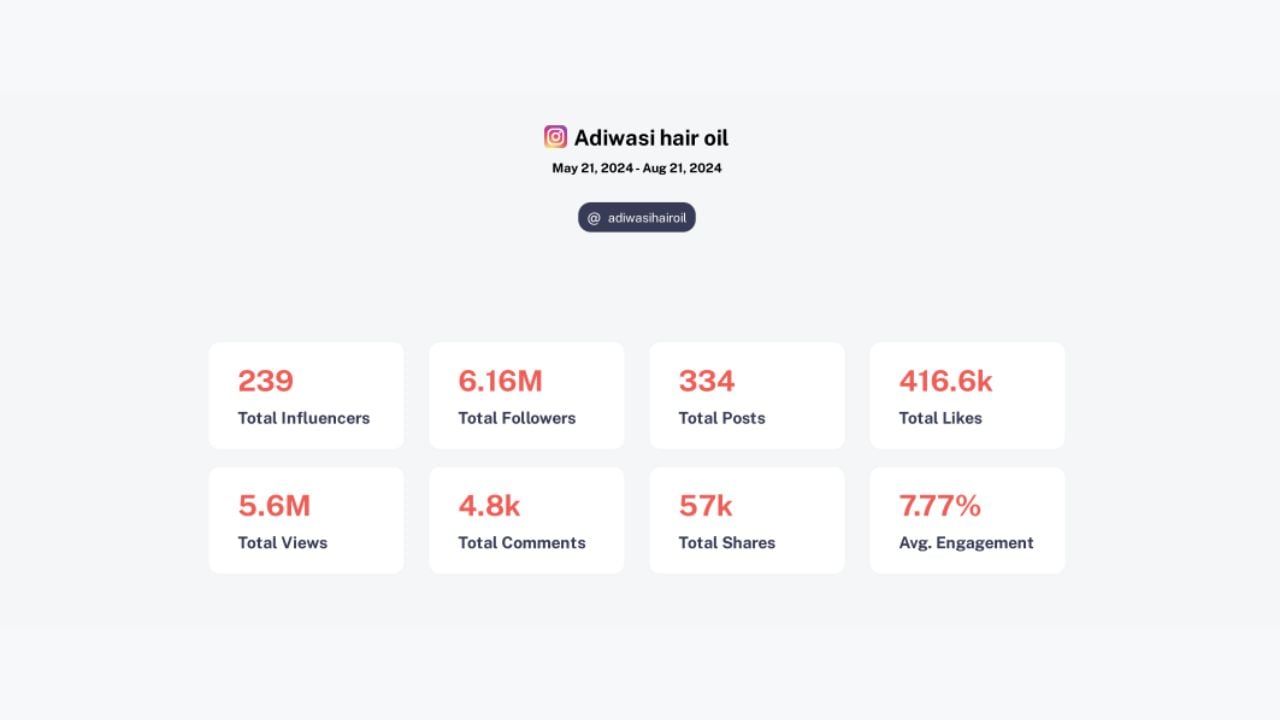
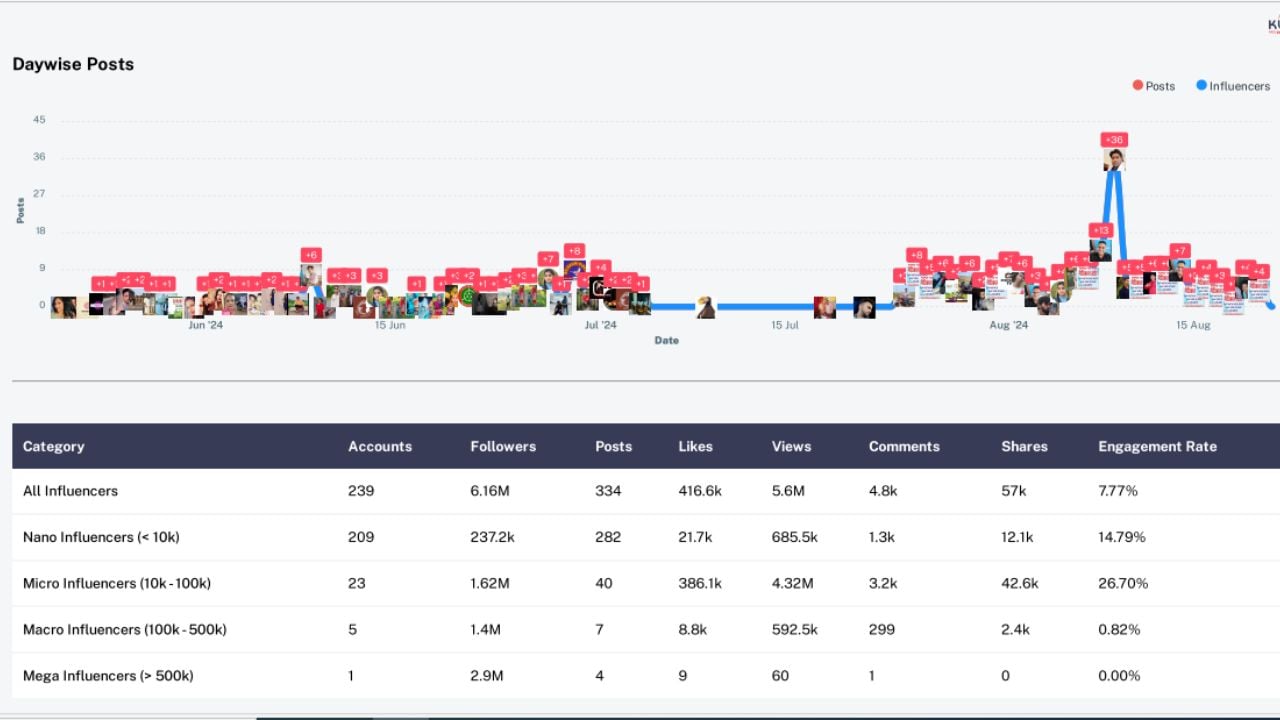
But, the reality is far from what has been projected.
“It had an unpleasant smell and did not improve my hair condition,”, “The worst oil ever used...my hair fall increased because of this”.
These are some of the reviews that pop up on Amazon when one wants to confirm the authenticity of the hair oil brand.
Amazon is not the only destination. Even YouTube is flooded with videos of people sharing their opinions on the hair oil brand which is not in a very positive light.
Though the brand is also available on Flipkart, its own official website carries reviews that greatly differ from the negative reviews on the e-commerce and social media platforms.
With the majority rating it a five, some of the reviews compliment the hair oil for reducing hair fall, dandruff, and showcasing significant improvement in the bald area.
What is so special about this brand?
Sandeep Raj, who is the owner of the Adivasi hair oil, along with his wife Sudha, prepare the oil with 108 herbal ingredients. Raj is a part of the Hakki Pikki tribal community, one of the major tribal communities in Karnataka which are predominantly bird catchers and hunters.
But how credible are endorsements by famed personalities of a brand that is not approved by FSSAI or FDA?
Endorsements: How credible are they?
Amyn Ghadiali, country head-India, GZ Creative Digital, said, “With great power comes great responsibility—especially for influencers, who wield word-of-mouth on steroids. They can make anything look legit, but without proper approvals like FSSAI or FDA, we're navigating ethically murky waters.”
He is also of the opinion that an influencer or a celebrity has more to lose in terms of credibility compared to the brand as there are a few identical Adivasi hair oils and they are interchangeable.
Let us look at 2023’s Noida startup scam. World Startup Convention depended on reliable voices like Ankur Warikoo (content creator), Chetan Bhagat (author and columnist), and Prafull Billore (founder, MBA Chai Wala) to spread word of mouth that personalities like X’s Elon Musk, Prince of Dubai, etc, were arriving.
Attendees shelled Rs 6,000 to Rs 8,000 for the pass, and the sponsors spent around Rs 50 lakh. However, all of that turned out to be a scam, and influencers were equally blamed for their unverified endorsements.
However, Jagdeep Kapoor, founder, chairman and managing director, Samsika Marketing Consultants is of the opinion that influencer marketing about something new isn’t a bad strategy. However, factual information should be disseminated based on scientific evidence to inform consumers of the risks and benefits.
According to Ashita Aggarwal, professor, marketing, SPJIMR, for Indian consumers, more than the certifications, the benefit stands important. Hence, word of mouth through celebs and real consumers appears more legitimate than any other kind of advertising and promotions.
She gives an example of the Prime range of beverages in the UK, which was built on the power of influencers. They strategically used influencers and social media to build virality. The brand tasted success across the world, but slowly.
Packaging: As per the industry standards?
Speaking of the packaging design, according to Samsika's Kapoor, though the packaging design is not as per the design standards of modern brands, as long as it contains true claims and is recognisable, that’s its primary purpose.
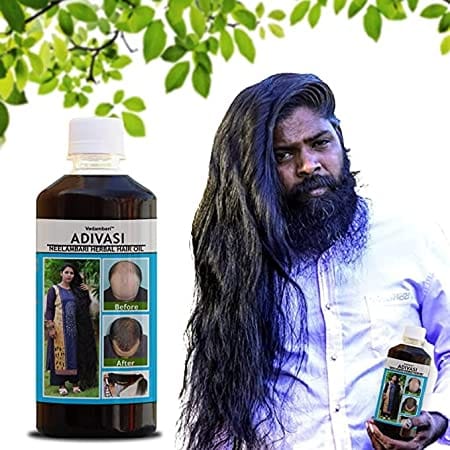
(Image source: Official website)
Anand Narasimha, professor - brand marketing, JAGSOM, said that if they are making a claim that it aids in the good health of the hair, then it is very crucial to have scientific packing.
Gozoop’s Ghadiali highlights the hair oil’s packaging is similar to their marketing—raw, unpolished which is exactly why it grabs attention.
“It’s not the usual sleek-haired model; it is real men and women of the community with oily hair. It’s not selling style; it’s selling 'effectiveness’,” he said.
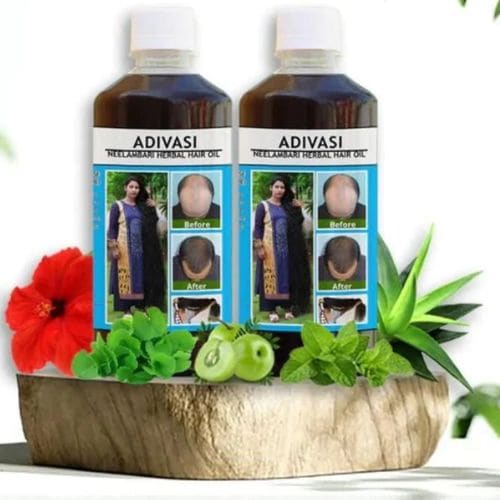
(Image source: Official website)
Ghadiali added that packaging needed clear labels, proper instructions, and safety info. And without regulatory approvals, the packaging would be authentic but the claims wouldn’t be genuine.
SPJIMR’s Aggarwal has a contrasting point. “If it’s sophisticated and elegant, probably people won’t trust the brand or buy it. The brand doesn’t want to and should not compare with industry products as then it will lose its ‘authentic’ imagery.”
Influencers: Earnings and parameters to endorse
Sooraj Pillai, group creative director, DDB Mudra Group, who hails from Chikmagalur, which is the central hub of Adivasi hair oil, calls the brand concept a ‘lie’.
He said, “Apart from monetary gains, I don’t see any other reason for anyone to endorse this product. Because there is no way to prove the product's effectiveness unless used for a long duration. And no influencer would have used it long enough to see any significant difference.”
JAGSOM’s Narasimha, Gozoop’s Ghadiali and Kalyan Kumar, co-founder and chief executive officer, KlugKlug concur.
However, SPJIMR’s Aggarwal is of the opinion that promoting brands like Adivasi hair oil signals inclusivity from the part of celebrities, as they want to be associated with new ‘authentic’ products.
Speaking of pay, KlugKlug's Kumar highlighted that in any normal environment, Yadav would charge upwards of Rs 20 to 30 lakh per post. “These things really sell well in the unorganised market. With the power of influencers, one gets into the visibility zone with powerful, semi-authentic tribal background conversations saying centuries of traditional research, etc,” he said.
Rohit Agarwal, founder and director, AlphaZegus Marketing, reveals that such personalities aren’t mainstream and need to find different ways of getting a paycheck.
Brands like Adivasi Hair Oil play it very safe and smart where they don’t rope in A-list of celebrities lest they come under the scanner.
They go for a B list or C list of celebrities so that their word is spread. It's also important to understand that there is this advocacy factor that exists, Agarwal said.
The other option that can be considered by a brand is looking out for creators that have a cult following where they can demand any kind of money.
In the case of real money gaming or betting categories, where they are bound by certain platform rules or government laws, they approach surrogate marketing or influencer marketing.
That's when they would put in a monthly budget of Rs three to four crore per month purely towards influencer marketing, Agarwal said.
According to Sharad Gupta, founder and chief executive officer, WNN-WhyNotNow Brand Consultancy, category-based online influencers can charge anything from Rs 10 lakh onwards for one exposure depending on the subscriber and follower base.
The majority of oil, fast food, cosmetics and lifestyle products indulge in such associations as they offer lucrative and long-term monetary benefits to the influencers and celebrities, Gupta revealed.
He also mentioned that the influencers or personalities also negotiate an equity or stake in the business, which is like an investment of growth as an alternate investment. As the brand or the product grows big, their equity brings a larger value to them, which is way larger than one-time brand ambassador fee.
Certified versus non-certified products: Endorsements, facts and difficulties
AlphaZegus’ Agarwal said that FSSAI products have more options to market in terms of platforms as compared to non-FSSAI products, which then resort to surrogate or influencer marketing.
Since the Adivasi hair oil brand is not certified, it will be unable to run TV commercials or digital ads or any forms of direct marketing. Otherwise, it will come under the platform, publisher, or government’s scanner.
WNN's Gupta said that non-certified product associations garner higher endorsement fees, depending on the platforms of visibility, online and offline mode and the duration or the frequency of exposure.
Be it certified or non-certified, in the end, trust plays a big factor.
One such example is Sanfe, a woman's body care brand, where actor Radhika Apte (onboarded in 2021) promoted the brand, which claimed that it was FDA approved, and was sent a show-cause notice in 2019.
As per Ghadiali, millions of women were convinced that their intimate whitening creams and bum-and-back lightening serums were the answer to their prayers. But they weren’t. “It’s a classic case of marketing magic tricking us into believing the unbelievable,” he said.
JAGSOM's Narasimha said, “As consumers, we should do research about the things that we are using that involve our health and not get carried away. Hence, all stakeholders need to become more conscious.”
In the case of e-commerce platforms, they should also do due diligence and be responsible with respect to the kind of products they are willing to sell on their platforms, he said.
Read More: What makes Deepika Padukone a brand?


